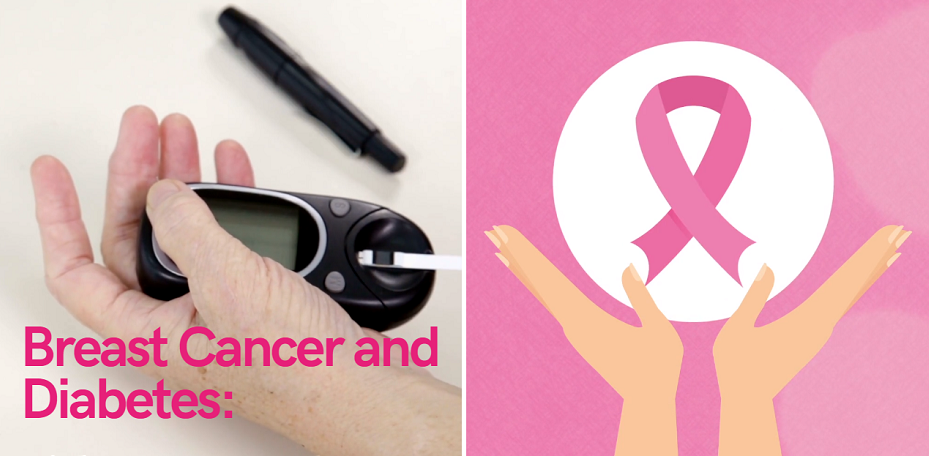Research has revealed that women with type 2 diabetes are at an increased risk of developing breast cancer. Diabetes is characterized by insulin resistance, which leads to decreased levels of estrogen, increasing the risk of cancer in the breast and other organs with a high estrogen demand (endometrium, ovaries). Additionally, women with diabetes have higher mortality rates associated with breast cancer. Diabetes can have several effects on breast cancer diagnosis, treatment methods and overall outcome of treatment. Let us take a look the impact diabetes can have on breast cancer.
Effects of diabetes on breast cancer
Increased risk and mortality
Several studies have shown that patients with diabetes have a higher risk of breast cancer than general population. Diabetic women diagnosed with breast cancer have a 40% higher risk of mortality than women without diabetes. High blood glucose level is associated with increase in a hormone called Insulin-like growth factor 1 (IGF-1) and inflammatory proteins, which may directly and indirectly influence the growth and metastasis of cancer cells.
Screening and diagnosis
Studies have reported that lower breast scanning rates were observed in women with diabetes and they present with more advanced stage breast cancer when diagnosed. Moreover, routine preventive cancer screening is often neglected in these women due to the complexity involved in diabetes care.
Treatment
Diabetes plays a crucial role in the decision-making related to breast cancer treatment.
Women with diabetes and other associated comorbidities receive less aggressive cancer treatments. Below are some impacts of diabetes on breast cancer treatment:
- Due to an increased risk of cardiovascular disease in diabetic women, cardiotoxic effects of certain chemotherapy regimens are considered before deciding on the specific chemotherapy regimen.
- More conservative chemotherapy is given in patients with diabetes and cardiovascular diseases.
- Radiotherapy may be avoided in diabetic women, due to its potential, long-term cardiotoxicity (damage to heart muscle).
- The extent to which the risk of cardiovascular disease in diabetic women affects a physician’s decision regarding a cancer treatment regimen remains unclear.
Treatment outcomes and prognosis
Below are some ways through which diabetes influences treatment outcomes and prognosis of breast cancer:
- Diabetes in breast cancer patients increases the risk of chemotherapy-related toxicity, resulting in poor responses to cancer treatment.
- Diabetes is associated with less favorable tumor characteristics including larger tumor size, advanced stage of tumor and poorly differentiated grade of tumor.
- It directly influences breast cancer progression through the effects of hyperglycemia (increased blood glucose levels).
- Medications used for diabetes may impact the course and progression of breast cancer.
- Metformin, an oral drug used for the treatment of type 2 diabetes is associated with a lower risk of breast cancer when compared to other anti-diabetic therapies.
Diabetes and Chemotherapy
There is a high risk of fluctuations of blood sugar levels during chemotherapy due to the associated side effects. Therefore, it is important to keep a check on blood sugar levels, more often than normal, during cancer treatment with chemotherapy. Some essential measures to be taken are:
- Adjustment of insulin dosage or change in type of insulin being used.
- Discussion with doctors about managing blood sugar levels based on effects of chemotherapy.
- Sometimes, diabetes is associated with nerve damage, which becomes worse with chemotherapy. In such cases, doctors may provide advice on pain management.
As mentioned above, diabetes can have a great impact on different aspects on breast cancer, and these are crucial factors which determine the course of breast cancer disease and its treatment in women with diabetes.
References:
- Lega I, Austin P, Fischer H et al. The Impact of Diabetes on Breast Cancer Treatments and Outcomes: A Population-Based Study. Diabetes Care. (2018) ;41(4):755-761.
- Michels K, Solomon C, Hu F et al. Type 2 Diabetes and Subsequent Incidence of Breast Cancer in the Nurses’ Health Study. Diabetes Care. 2003;26(6):1752-1758.
- Eketunde A. Diabetes as a Risk Factor for Breast Cancer. Cureus. 2020; 12(5): e8010.
- Breast Cancer Patients with Diabetes More Likely to Die. Johns Hopkins Medicine. https://www.hopkinsmedicine.org/news/media/releases/breast_cancer_patients_with_diabetes_more_likely_to_die
Accessed on 7 October, 2021. - Zhao X, Ren G. Diabetes mellitus and prognosis in women with breast cancer. Medicine (Baltimore). 2016;95(49):e5602.
- Mu L, Zhu N, Zhang J, Xing F, Li D, Wang X. Type 2 diabetes, insulin treatment and prognosis of breast cancer. Diabetes Metab Res Rev. 2016;33(1):e2823.
- Diabetes and chemotherapy. Macmillan Cancer Support.
https://www.macmillan.org.uk/cancer-information-and-support/treatment/coping-with-treatment/diabetes/chemotherapy
Accessed on 7 October, 2021. - How does having diabetes affect my cancer treatment? Memorial Sloan Kettering Cancer Center.
https://www.mskcc.org/news/how-does-having-diabetes-affect-my-treatment
Accessed on 7 October, 2021. - Ryu TY, Park J, Scherer P. Hyperglycemia as a risk factor for cancer progression. Diabetes Metab J. 2014 38:330–336.
- Oncogene activation induces metabolic transformation resulting in insulin-independence in human breast cancer cells. Bollig-Fischer A, Dewey TG, Ethier SP. PLoS One. 2011; 6:17959.
Know the cancer – Breast cancer treatment
Previous :Artificial Intelligence in Breast Cancer

